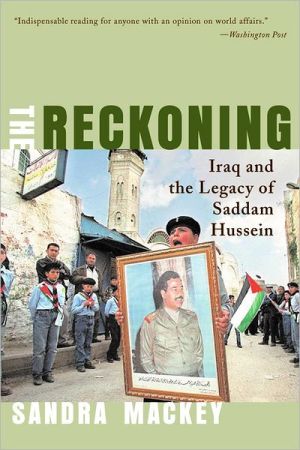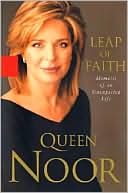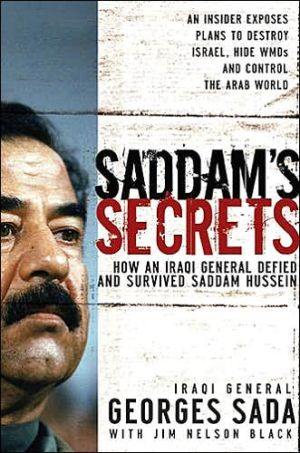The Reckoning: Iraq and the Legacy of Saddam Hussein
To the dismay of many in the West, the Gulf War ended with Saddam Hussein still in control, still defiant, and more determined to use any means of striking back. How far did he go? And now that Afghanistan's ruling Taliban has been vanquished and the al Quaeda network scattered, how far should the United States go in pursuit of its war on terrorism? The central question posed in this book is whether a future Iraq without Saddam Hussein will be even more unstable and more problematical to the...
Search in google:
Saddam Hussein is high on America's enemies list—but does an Iraq without him hold the seeds of the next Yugoslavia? Publishers Weekly A journalist who has long covered the Middle East, Mackey destroys the myth that toppling Saddam Hussein will solve Iraq's problems and America's. She clearly traces the complex and diverse history of the country from its biblical roots to the present day. The most salient feature of the country, she argues strongly, is its fragility: Iraq is a patchwork of peoples (both Sunni and Shi'ite Muslims, as well as Kurds) that hangs together by a thread. Without addressing how these peoples can form a national identity, the author claims, a post-Saddam Iraq could be worse than the Balkans. But even though much of the book centers on Iraq's long history, it is the author's account of the past 40 years that is the most instructive. While much of the information about Saddam has been presented elsewhere, Mackey summarizes his career well: his seizure of power, with its emphasis on the country's Arab roots, came after a long time of local chaos, and his rule of terror has kept him in charge but led to wars that impoverished his people. "Like Baghdad at the end of the Gulf War, Iraq itself is a body whose skin is intact but whose bones are broken." Mackey's last chapter is her most chilling. If there is no focus on what will come after Saddam, she says,then Iraq's future the disintegration of the country into separate warring cantons will be a nightmare, both for its people and for the United States. With the Bush administration focusing on Iraq as the next step in its war against terrorism, this book sounds an important cautionary note. (May) Forecast: Given its timeliness, this should receive serious review and media attention, and should draw handsome sales. Copyright 2002 Cahners Business Information.
Preface9Acknowledgments13Introduction171The Land between Two Rivers312The Human Mosaic of Iraq583The Improbable Country854Three Kings: Monarchical Iraq1215Identity in a Decade of Disorder1566The Triumph of the Baath1987The War of Identity2358Aggression and Rebellion2679Broken Babylon29910America between the Two Rivers33611The War of Containment35412The Road to Baghdad375Selected Bibliography397Index403
\ From Barnes & NobleThe good news is that Saddam Hussein can be toppled. The bad news is that an Iraq without Hussein would be an even more dangerous place. That's the message of The Reckoning, an examination of the area by veteran Middle East specialist Sandra Mackey. According to the author, a post-Saddam Iraq would be the site of conflict even more vicious and volatile than the Balkan wars. A dissonant view of a major issue.\ \ \ \ \ Publishers WeeklyA journalist who has long covered the Middle East, Mackey destroys the myth that toppling Saddam Hussein will solve Iraq's problems and America's. She clearly traces the complex and diverse history of the country from its biblical roots to the present day. The most salient feature of the country, she argues strongly, is its fragility: Iraq is a patchwork of peoples (both Sunni and Shi'ite Muslims, as well as Kurds) that hangs together by a thread. Without addressing how these peoples can form a national identity, the author claims, a post-Saddam Iraq could be worse than the Balkans. But even though much of the book centers on Iraq's long history, it is the author's account of the past 40 years that is the most instructive. While much of the information about Saddam has been presented elsewhere, Mackey summarizes his career well: his seizure of power, with its emphasis on the country's Arab roots, came after a long time of local chaos, and his rule of terror has kept him in charge but led to wars that impoverished his people. "Like Baghdad at the end of the Gulf War, Iraq itself is a body whose skin is intact but whose bones are broken." Mackey's last chapter is her most chilling. If there is no focus on what will come after Saddam, she says,then Iraq's future the disintegration of the country into separate warring cantons will be a nightmare, both for its people and for the United States. With the Bush administration focusing on Iraq as the next step in its war against terrorism, this book sounds an important cautionary note. (May) Forecast: Given its timeliness, this should receive serious review and media attention, and should draw handsome sales. Copyright 2002 Cahners Business Information.\ \ \ Foreign AffairsThis book starts by offering an engaging survey of Iraq from its early history up to the 1960s and then dives into a more detailed treatment of Saddam Hussein's rule. The title reveals Mackey's purpose: a review of the tortuous history of U.S.-Iraqi relations to explain why America is still trying to settle accounts today. Her own take on these stormy decades rightly stresses Saddam Hussein's ruthlessness. But she also criticizes the U.S. record, which included colluding with Pahlavi Iran to support Iraqi Kurds in the 1970s and then abandoning them, cozying up to Iraq during the Iran-Iraq War, and opting for "dual containment" of Iran and Iraq after the 1991 Persian Gulf War. Now, she writes, Washington is planning to "take out" Saddam Hussein while ignoring the deep-seated regional antipathy to America's long-standing pro-Israeli policy. She also cites the many domestic Iraqi problems hampering any possible move toward a better regime. An interpretation not to the taste of Washington hawks, but well informed and well presented.\ \ \ \ \ Library JournalIraq has been a country of great interest to the United States since the 1991 Gulf War. Although that conflict ended over a decade ago with the military defeat of Saddam Hussein's forces and their expulsion from Kuwait, low-level U.S. bombing of Iraqi targets has continued to the present time. The events of September 11 have elevated Iraq to a higher level of concern to U.S. decision-makers. In recent months, calls for a massive attack against Iraq are being heard from different governmental and journalistic corners in the United States. Yet, Iraq and its history remain a mystery to most Americans. This highly readable, jargon-free, and evenhanded book goes a long way in providing a comprehensive account of Iraq's recent political history to Western readers. Mackey, a veteran journalist who has traveled to Iraq and has written extensively on the Middle East, has done an admirable job of explaining the myriad social, political, and cultural forces that have shaped the contours of the contemporary Iraqi state and its authoritarian political system. Recommended for all public libraries. Nader Entessar, Spring Hill Coll., Mobile, AL Copyright 2002 Cahners Business Information.\ \ \ \ \ BooknewsA popular history of modern Iraq that, despite the impression given by its title (and a rather lurid introduction referencing "The War on Terror"), only discusses the Saddam Hussein regime in the latter half of the text. Journalist Mackey traces the history of the country from World War II to the present. Her purpose in the work is to question whether the American Government (whose motivations are not questioned) can successfully overthrow Hussein and contain the resultant unleashed forces that may contravene American "interests." Annotation c. Book News, Inc., Portland, OR (booknews.com)\ \








